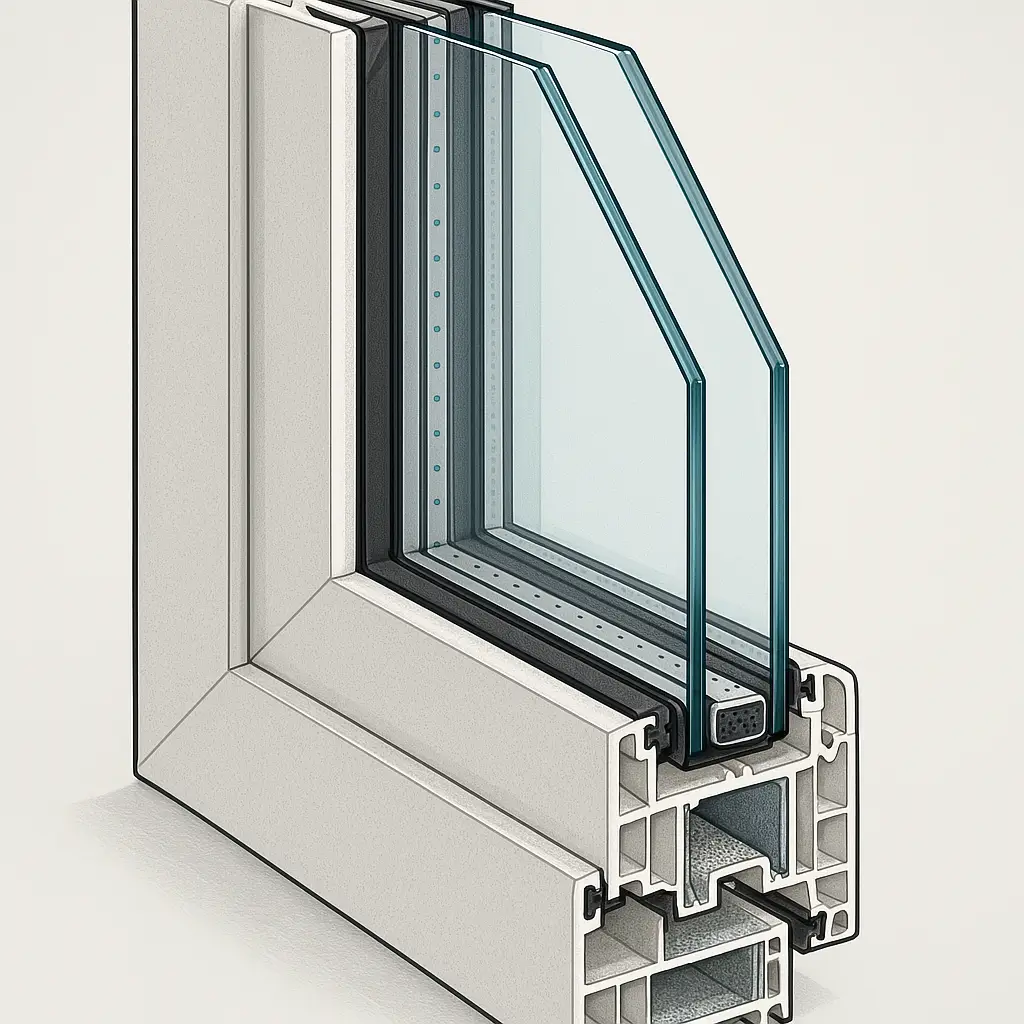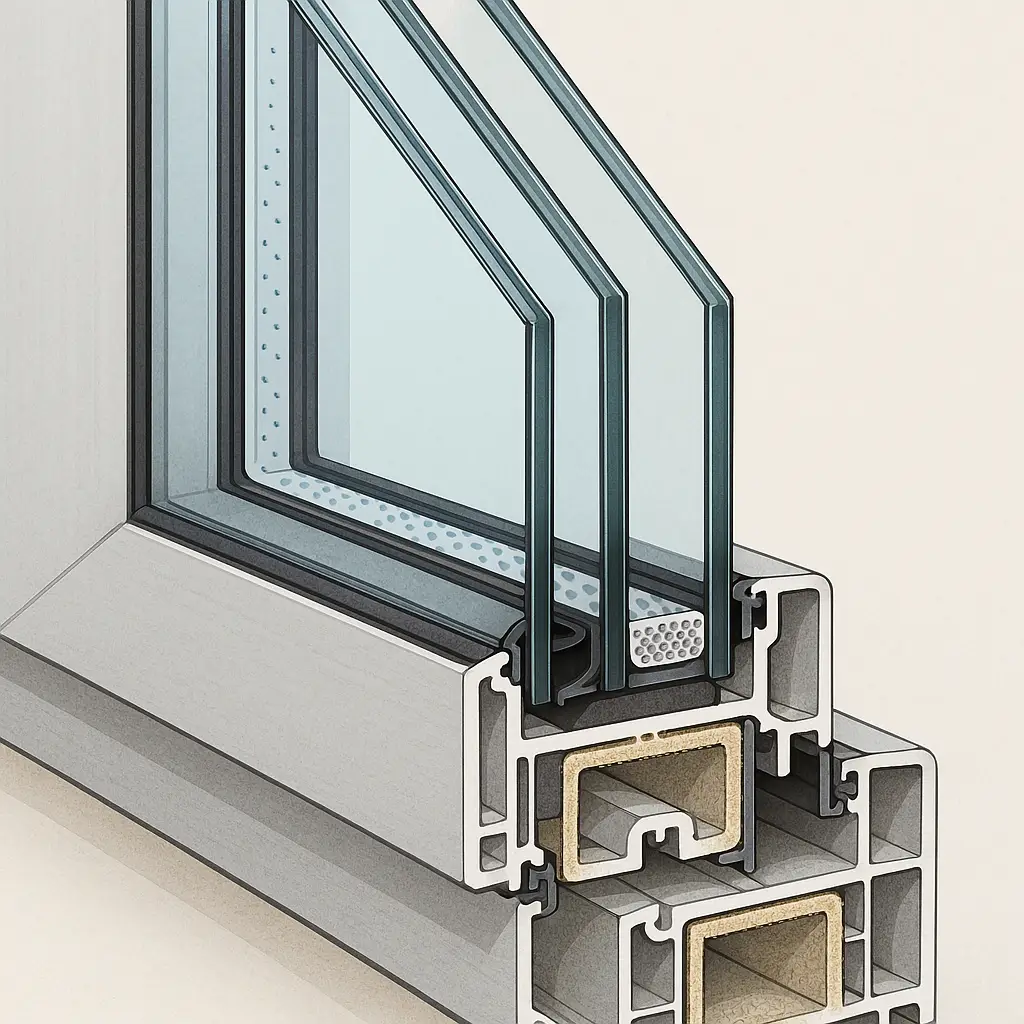When it comes to upgrading your home’s windows, choosing the right type of glazing can make a significant difference in comfort, energy savings, and noise levels. With rising energy costs and growing interest in sustainable living, many homeowners are asking the same question: what’s the difference between double and triple glazing?
In this article, we’ll break down the key differences between double glazing vs triple glazing, explore how each performs in terms of energy efficiency and noise reduction, and help you decide which option is the best fit for your home. Whether you’re replacing old windows or planning a new build, understanding the pros and cons of each glazing type will ensure you make a smart, long-term investment.

What is Double Glazing?
Double glazing refers to a window construction that uses two panes of glass separated by a spacer and a layer of insulating gas—typically argon or krypton. This design significantly reduces heat transfer between the inside and outside of your home, making it a popular choice for improving energy efficiency and comfort.
The space between the panes acts as a thermal barrier, helping to keep warm air in during the winter and out during the summer. This not only enhances indoor temperature regulation but also contributes to lower energy bills over time.
In addition to thermal performance, double glazed windows offer effective noise reduction, making them ideal for homes in moderately noisy environments. They also provide a decent level of security, as the dual layers of glass are harder to break than single-pane alternatives.
Key benefits of double glazing:
- Improved energy efficiency
- Noticeable noise reduction
- Enhanced security
- Reduced condensation
- Cost-effective upgrade for most homes

What is Triple Glazing?
Triple glazing takes window insulation a step further by using three panes of glass instead of two. Between each pane is a layer of insulating gas—usually argon or krypton—designed to reduce heat transfer and improve overall performance. This extra layer makes triple glazed windows one of the most advanced options available for homeowners seeking maximum comfort and efficiency.
The additional pane enhances energy efficiency, helping to maintain a consistent indoor temperature and reduce reliance on heating and cooling systems. This can lead to noticeable savings on energy bills, especially in colder climates or homes with large window areas.
Triple glazing also offers improved noise reduction, making it a strong choice for properties near busy roads, airports, or other noisy environments. However, the effectiveness of sound insulation can depend on the thickness and spacing of the panes, not just the number of them.
Key benefits of triple glazing:
- Superior energy efficiency compared to double glazing
- Enhanced noise reduction in many scenarios
- Increased security due to the extra pane
- Better resistance to condensation and cold spots
Key Differences Between Double and Triple Glazing
When comparing double glazing vs triple glazing, several important factors come into play. While both options offer improved insulation and comfort compared to single-pane windows, the differences in performance, cost, and practicality can influence which is the better option for your home.
1. Energy Efficiency
- Triple glazed windows typically offer lower U-values (a measure of heat loss), making them more effective at retaining heat.
- This means better energy efficiency, especially in colder climates or homes with high heating demands.
- However, the difference in energy savings may be marginal in milder regions.
2. Noise Reduction
- Both double and triple glazing provide noise reduction, but triple glazing can offer superior sound insulation—particularly when the glass panes are of varying thicknesses.
- That said, the improvement isn’t always dramatic and depends on the specific window construction.
3. Cost and Value
- Triple glazing is more expensive due to the extra pane of glass and added manufacturing complexity.
- While it can lead to long-term savings, the upfront cost may not be justified for every home.
4. Weight and Installation
- Triple glazed units are heavier, which can affect the type of window frame required and may not be suitable for all properties.
- Retrofitting triple glazing into existing frames can be challenging or even impossible without full replacement.
5. Security
- The extra layer in triple glazing adds another barrier against break-ins, offering enhanced security over double glazed windows.
Which Glazing Offers the Best Value?
Choosing between double glazed and triple glazed windows ultimately depends on your home’s specific needs, location, and budget. While triple glazing offers superior energy efficiency and noise reduction, double glazing is more cost effective in most cases.
When Double Glazing is the Better Option
- Ideal for homes in milder climates where extreme insulation isn’t necessary.
- A smart choice for homeowners looking to upgrade from single glazing without a major investment.
- Works well in properties with existing window frames that may not support the extra weight of triple glazing.
When Triple Glazing is Worth It
- Best suited for colder regions or homes with high heating demands.
- A great option for properties near busy roads, airports, or other noisy environments where noise reduction is a priority.
- More beneficial in new builds or full renovations where window specifications can be tailored from the start.
In short, glazing offers different advantages depending on your priorities. If you’re focused on maximum performance and long-term savings, triple glazed windows may be worth the investment. But for many homes, double glazing still provides excellent value and comfort.
Making the right choice
Understanding the difference between double and triple glazing is key to making an informed decision for your home. While double glazed windows offer excellent performance for most properties, triple glazed windows provide enhanced energy efficiency and noise reduction—especially valuable in colder climates or noisy environments.
Ultimately, the right choice depends on your specific needs, budget, and the structure of your home. Whether you’re upgrading existing windows or planning a new build, both options can significantly improve comfort, security, and long-term savings.
